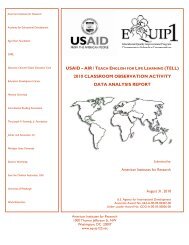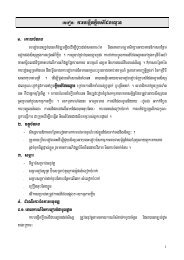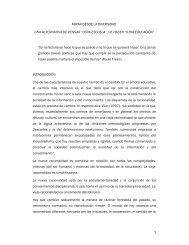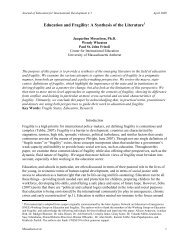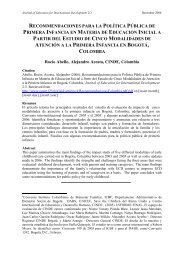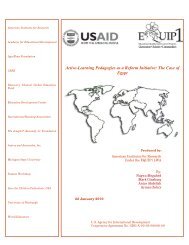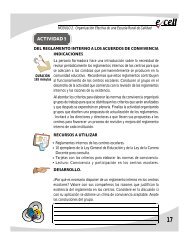The Power of Persistence: Education System ... - EQUIP123.net
The Power of Persistence: Education System ... - EQUIP123.net
The Power of Persistence: Education System ... - EQUIP123.net
Create successful ePaper yourself
Turn your PDF publications into a flip-book with our unique Google optimized e-Paper software.
system. In the same year, the USAID provided a substantial program—the<br />
<strong>Education</strong> Reform Program—with assistance at both the system and school levels<br />
to help implement the reforms. Over the next two years, reforms struggled to take<br />
hold during a period in which the country underwent two changes <strong>of</strong> Minister<br />
<strong>of</strong> <strong>Education</strong>, replacement <strong>of</strong> several governors, and other changes. <strong>The</strong> period <strong>of</strong><br />
2005 to 2008 saw an impressive increase in planning and policy initiatives.<br />
Significant progress on decentralization is only now beginning to be<br />
incorporated in the institutional framework <strong>of</strong> policies and procedures, and<br />
policy implementation is in its early stages. After uneven initiatives in the 1990s,<br />
a deliberate and cautious process began with the pilot effort in Alexandria<br />
in 2001. Authority was delegated to six additional governorates in 2003, and<br />
there has been a growing momentum <strong>of</strong> substantial policy reforms since 2005.<br />
Between 2006 and 2008, at least eight major policy reforms were formulated<br />
affecting community participation and authority, financial decentralization,<br />
quality assurance, teacher development, and decentralization for school spending<br />
authority. However, the implementation <strong>of</strong> these reforms is only just starting with<br />
a small-scale pilot <strong>of</strong> financial transfers to schools.<br />
Development <strong>of</strong> strategic planning processes followed a similar pattern. Strategic<br />
planning was initiated on a pilot basis by ERP first in one, and then in seven<br />
governorates before becoming a national initiative. <strong>The</strong> National Strategic Plan<br />
not only was coordinated bi-directionally with the seven governorate planning<br />
process, but also facilitated strategic planning initiatives in all other governorates.<br />
<strong>The</strong> expansion <strong>of</strong> the strategic planning process is an example <strong>of</strong> scaling up <strong>of</strong> a<br />
process and planning mentality rather than a specific intervention.<br />
<strong>The</strong> accelerating momentum <strong>of</strong> key reforms in planning, decentralization, and<br />
community participation was made possible by the confluence <strong>of</strong> several key<br />
factors. <strong>The</strong> successful and highly visible pilot program in Alexandria was<br />
critical for several reasons. Initially, the experience provided a degree <strong>of</strong><br />
confidence to senior policymakers about the reforms, which enabled the<br />
2003 decision to extend limited authority to six other governors who had the<br />
confidence <strong>of</strong> the Minister <strong>of</strong> <strong>Education</strong>. Changes in leadership in the MOE and<br />
governorates over the next two years slowed progress, but in 2005 the leaders <strong>of</strong><br />
the Alexandria pilot were named to the key positions <strong>of</strong> Minister <strong>of</strong> <strong>Education</strong><br />
and Minister <strong>of</strong> Local Government.<br />
<strong>The</strong>se changes coincided with ERP providing technical and financial support for<br />
decentralization, which was managed by the same USAID project <strong>of</strong>ficer who had<br />
implemented the Alexandria reforms with the new Minister. Rounding out the<br />
circle <strong>of</strong> relationships, the new Minister <strong>of</strong> <strong>Education</strong> named a senior Egyptian<br />
52<br />
SECTION 2: lESSONS fROM COUNTRY CASE STUdIES



